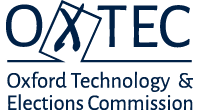Press release: New commission to address technological threats to democracy
The Oxford Internet Institute, part of the University of Oxford, is today launching a new commission to find ways to safeguard democracy from the potentially disruptive influences of modern technology, such as misinformation, “fake news” and micro-targeting in political campaigns.
The Oxford Technology and Elections Commission (OxTEC) will bring together researchers, technology experts and policymakers to analyse how social media, big data, artificial intelligence and digital platforms are impacting today’s elections and democratic participation across the world. Its first meeting will take place today (Thursday 25 April) and the Commission will release several reports in the coming months on the (self-)regulation of social media platforms, the law on elections and technology, how to address “fake news” and technological threats to the integrity of public votes.
The commissioners are: Mohamed Amersi, Founder & CEO of Emergent Telecom Ventures; Christina Blacklaws, President of The Law Society of England and Wales; Dame Helen Ghosh, former Permanent Secretary at the Home Office; Professor Philip Howard, Director of the OII; and Paddy McGuinness, Senior Advisor at the Brunswick Group and the UK’s Deputy National Security Adviser from 2014-2018. Award-winning lawyer Ravi Naik, a partner at Irvine Thanvi Natas Solicitors who led the first legal case against Cambridge Analytica, and Emily Taylor, an associate fellow with the International Security Department, are among the Commission’s researchers.
“Voting should help resolve issues, not create new public problems or what we have come to call internet harms,” said Professor Philip Howard, Director of the OII. “Setting some new election guidelines requires some careful thinking. We have to focus on fundamental mechanisms of participatory democracies, setting aside partisanship and resisting the urge to tackle everything we might dislike in modern political campaigning. As modern political campaigns have moved online, existing regulatory frameworks are unprepared to address complex issues in relation to micro-targeting and covert information operations.”
The Commission has several goals, including:
- Build a broad alliance of stakeholders to speak with a unified voice about the urgency of fully securing the information infrastructure of elections.
- Elevate promising practices and innovative policies, collected from democracies around the world, that protect individual human rights of privacy, information access, and participation in free and fair elections.
- Identify the next generation of research and policy guidelines needed to effectively integrate data-intensive political campaigning with rules on elections administration.
- Recommend specific action steps in research, practice, and policy to create a trusted environment for the use of technology in campaigns and elections.
Coming as governments around the world look at new ways to regulate the internet, the Commission hopes to inform debate on how to protect against the harmful consequences of technological change without stifling online freedom.
Christina Blacklaws said: “Emergent technologies are creating a seismic shift in our societies, with new opportunities and challenges. One of the most fundamental and powerful areas where we experience this is in our democratic functions such as elections. The work of this Commission is vital and timely. We need to address the potential problems to enable us to leverage the benefits. In many ways, this is one of the most important issues of our time.’
“Democracy is under threat and elections are being manipulated. Trust in the ballot box is at an all-time low. Safeguarding the very principles and values that underpin law and order, peace and prosperity is and must be the number one global priority. This is why the formation of the OII and its work is prescient. It’s a privilege to be a part of this initiative,” said Mohamed Amersi.
“Discussion about how to counter attempts to manipulate and discredit electoral processes has been rather diffuse and breathless – in some cases it has done the hostile actor’s work for them by creating uncertainty,” said Paddy McGuinness. “It is vital for the credibility of the electoral system that our approach to elections is transparent and open to interrogation by all. Academia and non-governmental are best placed to create this space.”
Dame Helen Ghosh said: “It’s clear from events around the world that people are losing faith in ‘traditional’ democracy and choosing other ways to get their voices heard, whether through direct action or untried political movements. This Commission offers the chance to restore some of that faith, and with that ensure wider participation in a genuinely democratic process.”
For more information please contact press@oii.ox.ac.uk or call +44 (0)1865 287 210.
